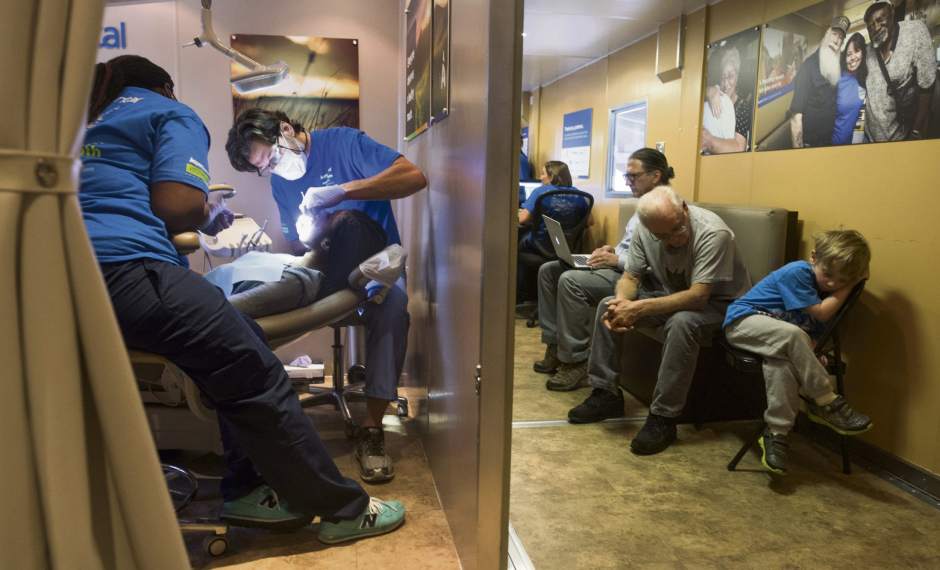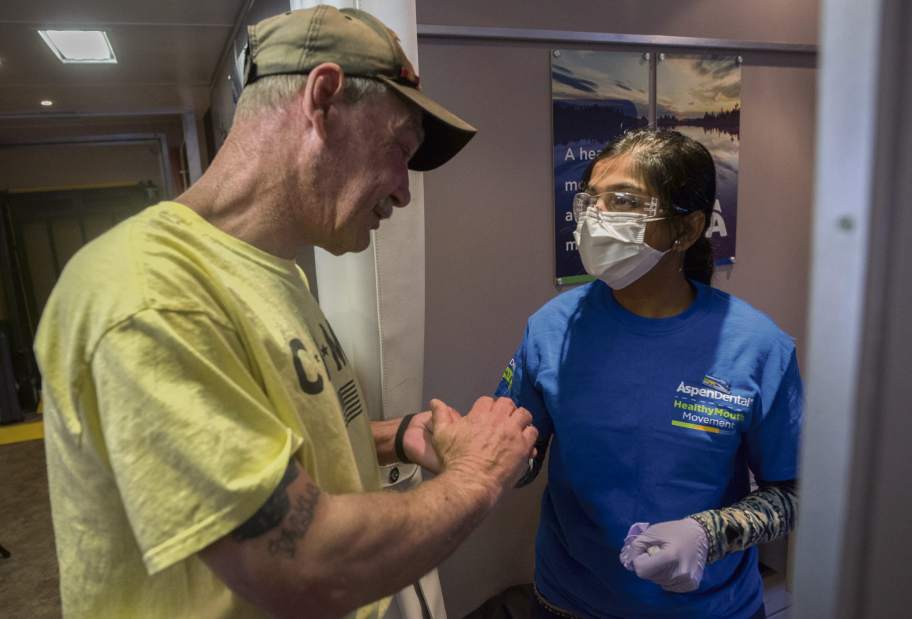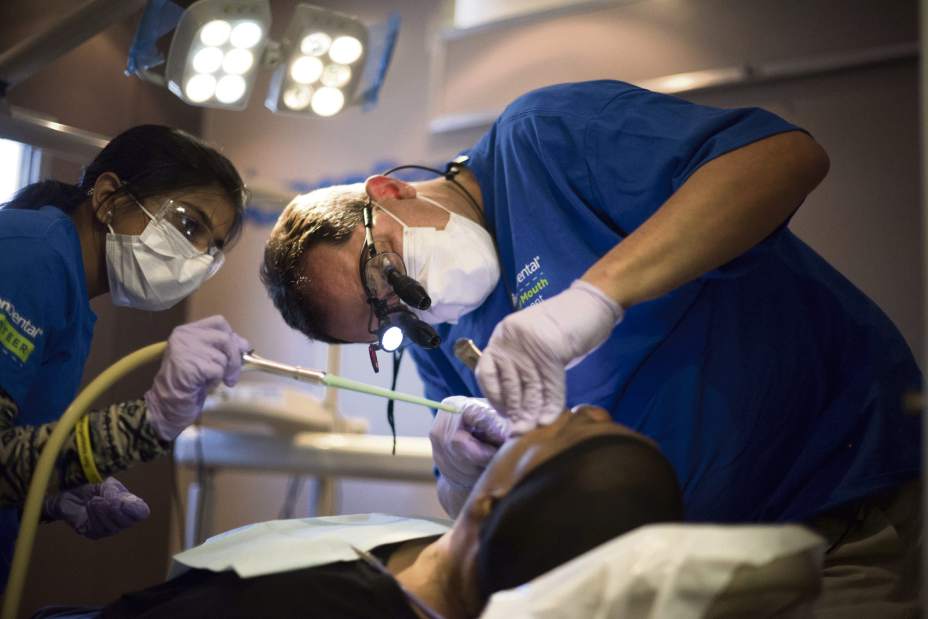Free dental-care program stops by Western Pennsylvania to fill gaps in coverage for veterans
Frank Merry had just four teeth left — and they all needed to come out.
The 61-year-old Navy veteran from McKees Rocks arrived outside the mobile dental office in Highmark Stadium's parking lot this week in excruciating pain.
Four tooth extractions later, Merry sat in the waiting area chatting happily about his love for the Steelers and gratitude for the free treatment, even though it left him with nothing but gums.
Then out came a dental hygienist, her face beaming as she told the Vietnam War-era aviation electronics technician, “Hey, we're going to adopt you, Frank. We're going to give you a free set of dentures.”
Merry's eyes began to well with tears.
“How great is that,” Merry said moments later outside Aspen Dental's MouthMobile van, which travels the country providing free dental care for vets. “Now that's a godsend for a company. That's really people who've got humbleness, kindness and compassion for us vets.”
The unexpected gesture mattered all the more to Merry because, like the majority of veterans, he doesn't qualify for dental benefits provided by the Veterans Health Administration.
The VA only offers dental care under limited circumstances, such as if a military member sustained a mouth-related combat injury, is considered 100 percent disabled or was a prisoner of war.
“It's good that we can do these types of things,” said Dr. Scott Cigmetti, a Greensburg-based dentist. He was among a few dozen Aspen Dental employees who volunteered their time Tuesday to treat 25 veterans, including Merry. In its next event, on June 24, the company will open 450 offices nationwide exclusively to treat veterans free of charge.
“The mouth is the gateway to the body,” Cigmetti continued, “and so I don't know how physically it's detached for the purpose of benefits.”
The dilemma has mobilized a mix of businesses, nonprofits and veterans advocates seeking to help fill the gap.
“Most people don't know — including most veterans — that the vast majority of veterans can't go to the VA for dental care,” said Bill Rausch, executive director of Got Your 6, a Washington-based veterans empowerment nonprofit that helps promote MouthMobile events with Aspen Dental and local vets groups nationwide. “That's why it's really, really important to have partnerships in the private sector like Aspen Dental, who are donating not only their time and their treasury, but really their entire organization.”
Last year, the VA provided dental care to about 505,000 veterans — a tiny fraction when compared to the 6.9 million veterans who received non-dental-related health care, and even tinier when compared to the entire 21 million-strong U.S. veteran population.
Greater Pittsburgh alone is home to about 180,000 veterans, regional records show.
“You have people going to the emergency room for toothaches,” said Ben Stahl of Forest Hills, a Navy veteran and executive director of the Veterans Leadership Program of Western Pennsylvania.
Recognizing the coverage gap, federal lawmakers in 2012 authorized the VA Dental Insurance Program, a pilot effort to enable veterans to buy discounted dental insurance from private carriers.
As of December, about 103,000 veterans and more than 115,000 veterans and beneficiaries were enrolled in the program, according to Kathleen Pomorski, spokeswoman for the VA Pittsburgh Healthcare System. Ninety-two percent of participants told the VA they were satisfied with the program and would renew their enrollment.
“I don't think that it was really pushed or maybe publicized as broadly as it could have been,” noted Stahl. “I would love to see that rolled out broadly.”
Starting this summer, the reduced-cost private dental insurance program known as VADIP will open for wider enrollment, thanks to Congress reauthorizing the program through 2021, Pomorski said by email.
“We expect to have the new contracts in place and to reopen enrollment (in) June 2017,” she said.
Sen. Bob Casey, D-Scranton, said he's pleased the pilot was extended because the nation has “an abiding obligation to serve the brave men and women who have served our country.
“It is critical that we make sure veterans have access to the health care that they need and have earned,” Casey said by email. “Dental care is an important part of overall health care.”
Stahl said assistance paying for dental care “is a much-needed service even beyond the veterans' space, just for low-income individuals in general,” he said. “Dental care is cost-prohibitive. It's viewed as a luxury.”
Cavity fillings, for example, range from $50 to $150, and extractions can cost $180 to $400. Dentures can start at $300 and climb to more than $3,000 per plate.
The typical veteran is entitled to just one dental screening within 180 days of an honorable discharge — and only if they served on active duty for 90 days or more and can prove they had a complete dental examination prior to separation.
Even veterans who suffer from major combat wounds do not qualify for dental coverage unless they can provide documentation proving their service-related injury affected their mouth.
Merry — eager to get his donated dentures fitted next week — put his take on the VA's dental care policies bluntly: “That's a bunch of bull. If we put our lives on the line to protect you, you should give us more than what we're getting.”
Natasha Lindstrom is a Tribune-Review staff writer. Reach her at 412-380-8514, nlindstrom@tribweb.com or on Twitter @NewsNatasha.




